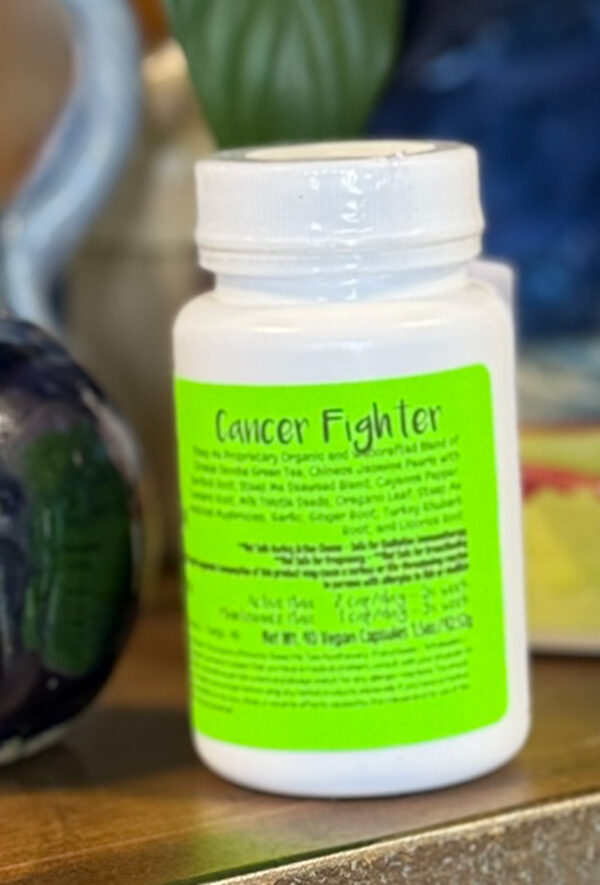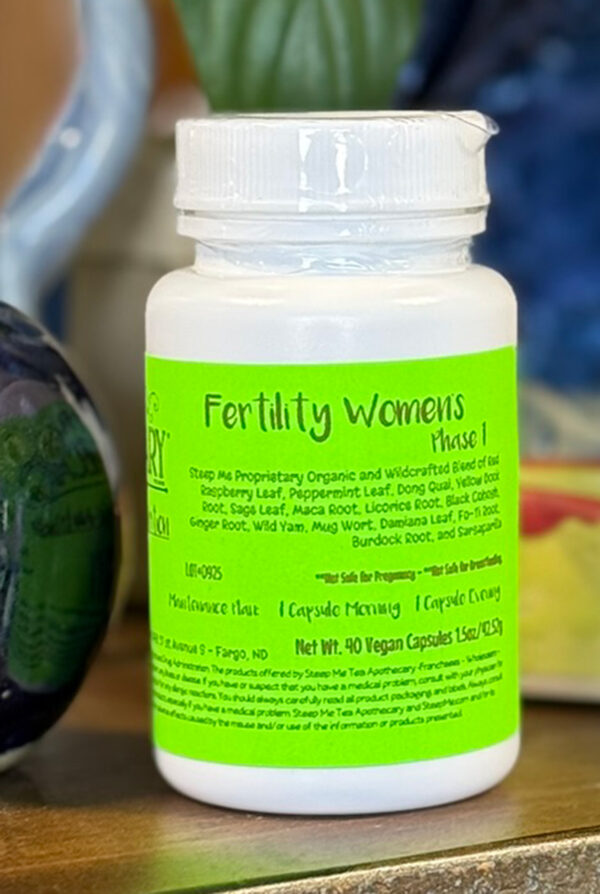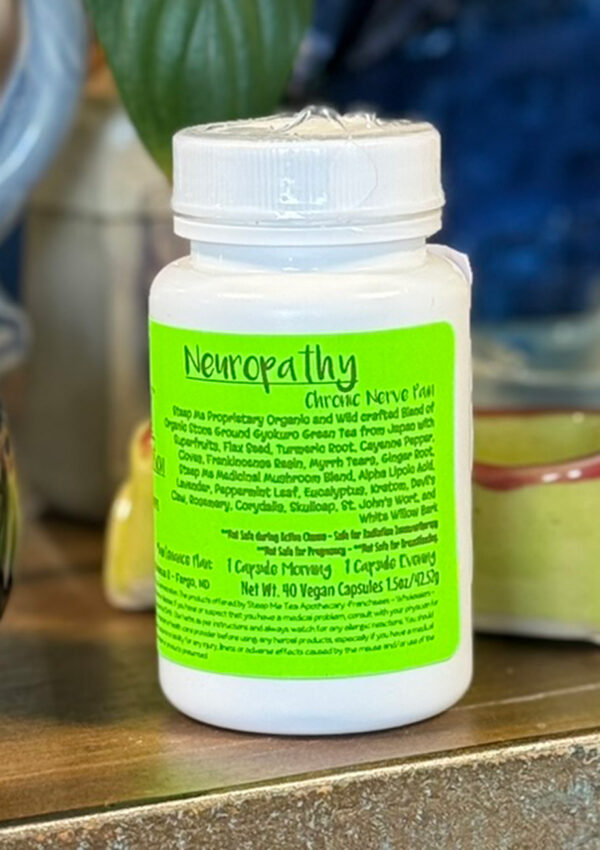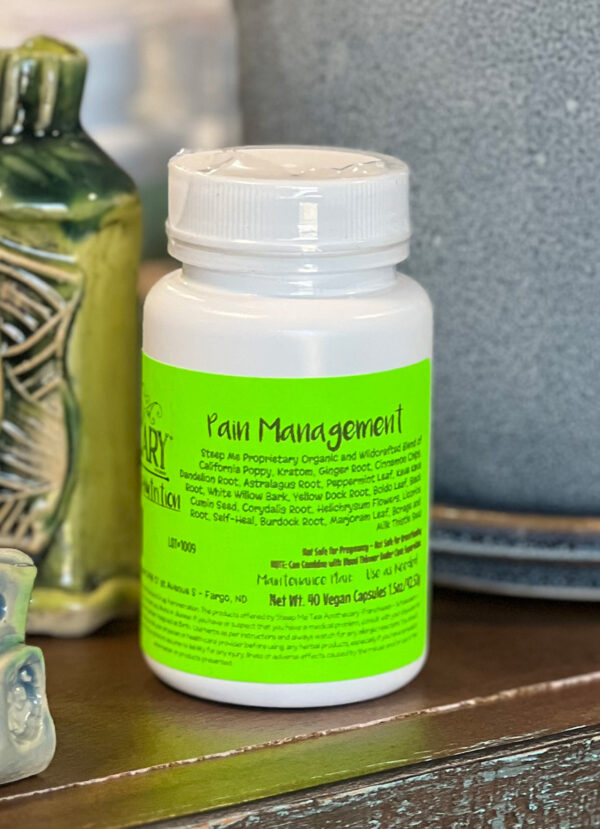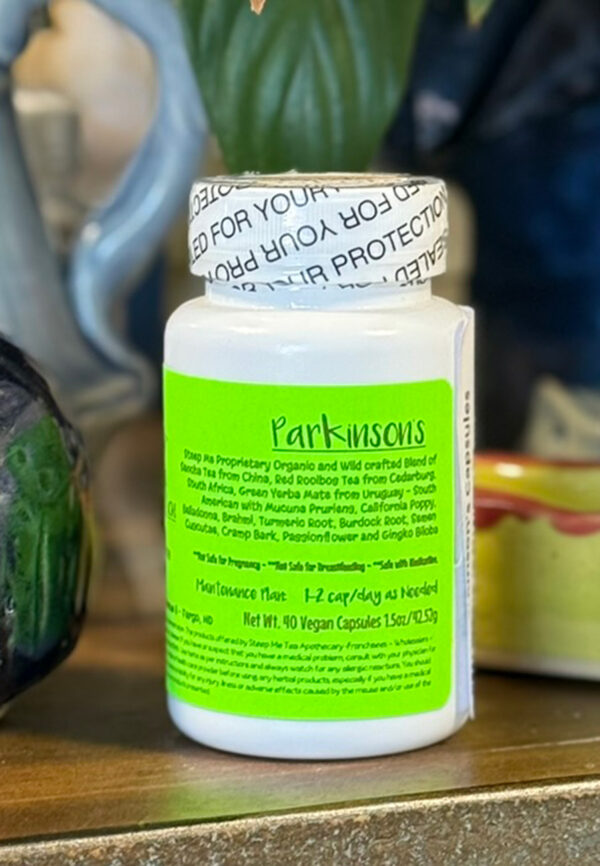With over 400 different kinds of loose tea that will exceed all tea lover’s expectations. You’re sure to find something you will love! All handcrafted by us in North Dakota.
“High Blood Pressure Capsules” has been added to your cart. View cart
Description
Blender’s Notes Lymphedema 2.0:
Steep Me Self-Help combinations are a wonderful way to get health benefits outside of the standard tea leaf. In this combination of herbs, we really wanted to offer a blend to provide symptom management for your Lymphedema. What is Lymphedema? Lymphedema refers to tissue swelling caused by an accumulation of protein-rich fluid that is usually drained through the body’s lymphatic system. It most commonly affects the arms or legs, but can also occur in the chest wall, abdomen, neck, and genitals. Lymph nodes are an important part of your lymphatic system. The lymphatic system is an essential part of the immune system. It works to maintain fluid balance by absorbing fats and fat-soluble nutrients and getting rid of cellular waste. It is often referred to as the body’s “sewerage system,” as it collects and drains excess interstitial fluid away from the tissues. Supporting a healthy lymphatic system is critical because failure to drain excess fluid causes swelling and other serious health problems. Fortunately, many herbs are effective in promoting lymphatic detoxification and circulation. These herbs can help promote and improve the function of the lymphatic system. Herbs are a natural and safe way to detoxify your lymphatic system and allow them to function properly. These capsules will help boost the drainage system.
This blend begins with Turmeric, Garlic, and Ginger. These herbs are great supportive herbs for Lymphedema. are anti-inflammatory, antioxidant, and circulation-supportive foods that may help reduce swelling, improve lymphatic flow, and lower infection risk. Turmeric is a potent anti-inflammatory by inhibiting COX-2 and NF-κB pathways as an Antioxidant it neutralizes free radicals and protects tissues from oxidative stress and it may reduce fibrosis by regulating matrix metalloproteinases (MMPs), which is relevant since lymphedema often leads to tissue hardening. Garlic contains Allicin, sulfur compounds which help prevent infections, especially cellulitis, which is a major complication of lymphedema, supports white blood cell activity, reduces cytokine activity and oxidative stress and aids detoxification, easing lymphatic burden. Ginger contains gingerols & shogaols which inhibit COX-2 and prostaglandins, reducing swelling, improving blood and lymphatic flow, helping reduce congestion, stimulate digestion and liver function, indirectly aiding lymphatic clearance and protects tissues from oxidative damage. Cayenne Pepper was included because it contains Capsaicin which acts as a vasodilator, widening blood vessels and improving blood flow. Better circulation can indirectly support lymphatic drainage and reduce fluid stagnation, and it is s considered a natural stimulant that increases the “pulse” of both the circulatory and lymphatic systems. This may help move lymph fluid more effectively and reduce blockages. Cayenne Peppe’s Capsaicin inhibits pro-inflammatory mediators, helping to reduce swelling and tissue irritation. Since lymphedema involves chronic inflammation. Also, by stimulating circulation and inducing sweating, cayenne enhances the body’s natural detox pathways, which can ease the burden on the lymphatic system and because it is rich in vitamin C, vitamin A, and flavonoids, cayenne provides antioxidant protection. Next, we added Echinacea because it acts as an immune stimulant, which means it stimulates the immune system to fight infections more effectively. It contains alkylamine, a phytochemical that increases the production of macrophages and lymphocytes. Both cells combat infection by killing bacteria, reducing inflammation and pain, and promoting lymphatic drainage. Astragalus helps cleanse and heal infected lymph nodes by easing swelling and congestion. It is an apoptogenic herb, meaning it can remove free radicals and stressors, whether physical, chemical, or biological. It has been used in Chinese traditional medicine to treat swelling and boost the immune system. Astragalus and echinacea work well together. Red root (Ceanothus americanus, also called New Jersey Tea) is considered by herbalists to be a powerful lymphatic tonic and is included in this recipe. It is categorized as “moving interstitial fluids,” helping to clear stagnant lymph and reduce swelling in nodes and tissues and may improve filtration of blood and lymph, indirectly easing lymphatic burden since it supports support the spleen and liver. Red Root is rich in tannins and alkaloids, red root has astringent and anti-inflammatory properties, which may help reduce tissue irritation and congestion.
The next item we added were Cranberries. Cranberries are rich in proanthocyanidins, anthocyanins, flavonoids, and vitamin C, which help neutralize free radicals. Since oxidative stress contributes to fibrosis and tissue damage in lymphedema, this antioxidant load is protective. Cranberry polyphenols reduce inflammatory markers and may help calm chronic low-grade inflammation, a key driver of swelling and tissue changes in lymphedema. Cranberries have mild diuretic properties, helping the body eliminate excess fluid and sodium and re best known for preventing urinary tract infections (UTIs) by preventing bacteria from adhering to mucosal surfaces, they can lower LDL cholesterol, improve HDL, and support endothelial function which supports lymphatic drainage. and lymphedema patients, who are prone to cellulitis and recurrent infections, this immune support may be valuable. We also included Nettles. Nettle leaf increases urine output, helping the body eliminate excess fluid and metabolic waste without depleting electrolytes and it is rich in flavonoids, carotenoids, and phenolic acids, nettle reduces inflammatory mediators, which may help calm the chronic inflammation that drives fibrosis in lymphedema. Nettle replenishes minerals often lost with fluid shifts, supporting tissue repair and immune function because it is high in potassium, magnesium, calcium, iron, and vitamins A, C, and K. Plus nettle helps clear toxins, easing the burden on the lymphatic system. Steep Me Medicinal Mushrooms were added because they contain beta-glucans that enhance immune surveillance and reduce infection risk. This is important since cellulitis is a common complication of lymphedema, they educe pro-inflammatory cytokines (e.g., TNF-α, IL-6), helping calm the chronic inflammation that drives fibrosis in lymphedema, are rich in polyphenols and melanin-like compounds that neutralize free radicals, protecting tissues from oxidative stress, improves oxygen utilization and ATP production, which may enhance microcirculation and lymphatic flow, and act as prebiotics, supporting gut microbiota balance. Healthier guts reduce systemic inflammation, indirectly supporting lymphatic health. Next, we added Amla Berries. Amla Berries are one of the richest natural sources of vitamin C (up to 600 mg/100 g) and contain polyphenols, flavonoids, and tannins that neutralize free radicals. This may help reduce tissue damage and fibrosis progression since Lymphedema is associated with chronic inflammation and oxidative damage in lymphatic tissues. Amla has been shown to downregulate pro-inflammatory cytokines and reduce systemic inflammation. Since lymphedema involves persistent inflammatory signaling, this could theoretically ease swelling and tissue changes. In lymphedema, where skin and subcutaneous tissues are under stress, amla’s nutrient profile may support tissue resilience Vitamin C is essential for collagen synthesis and connective tissue repair. Amla improves endothelial function and lipid metabolism. Better vascular health may indirectly support lymphatic drainage and reduce secondary cardiovascular strain.
We also added Mullein for lymphatic congestion or swollen lymph nodes, often combined with stronger lymphagogues like cleavers and red clover. Mullein leaves and flowers contain mucilage, flavonoids, and saponins, which calm irritated tissues and reduce inflammation. This may help with the chronic inflammatory environment of lymphedema. Mullein extracts show antibacterial and antiviral activity, which could help reduce infection risk—important since cellulitis is a common complication of lymphedema. Next is Cleavers. Cleavers (Galium aparine) are one of the most widely used lymphatic herbs and valued for stimulating lymphatic drainage, reducing congestion, easing fluid retention, and supporting detoxification. Cleavers is considered a lymphagogue—an herb that stimulates lymph flow. By enhancing lymphatic circulation, it may help reduce stagnation, swollen nodes, and heaviness in affected limbs. t promotes elimination of metabolic waste and toxins via both the lymphatic and urinary systems, which can reduce systemic inflammatory burden. It has anti-inflammatory effects, which may ease discomfort and slow tissue fibrosis associated with chronic lymphedema and helps break fibrous tissue and calcifications, which can be relevant in advanced lymphedema where fibrosis develops. Red Clover as also included. It is valued as a blood and lymph “purifier” and stimulates lacteal activity in the lymphatic system, enhancing waste removal and promoting better lymphatic flow. Isoflavones and flavonoids in red clover support detoxification pathways, helping reduce systemic toxin burden that can worsen lymphatic congestion. Red clover extracts inhibit inflammatory mediators, which may help calm the chronic inflammation and fibrosis associated with lymphedema. Next is Goldenseal. Goldenseal contains berberine, hydrastine, and canadine, alkaloids with strong antibacterial, antifungal, and antiviral activity. Since lymphedema patients are prone to recurrent cellulitis and skin infections, goldenseal may help reduce microbial burden and support and Berberine has been shown to downregulate pro-inflammatory cytokines and reduce mucosal inflammation. Goldenseal stimulates bile flow and liver enzyme activity, aiding detoxification. Since lymphatic congestion is tied to impaired clearance of metabolic waste, this may provide indirect relief and used as a mucosal tonic, goldenseal’s astringent properties may help tighten tissues and reduce excessive secretions, though this is more relevant to digestive and respiratory health than lymphatic swelling. We also added Dandelion. Dandelion may help reduce fluid retention, support detoxification, and ease swelling. Dandelion leaves function as a potassium-sparing diuretic, promoting urine output without depleting electrolytes. This helps reduce fluid retention and swelling in tissues. The root stimulates bile production and supports detoxification pathways, while also enhancing kidney clearance of waste. This dual action helps reduce systemic toxin load and supports lymphatic balance. Rich in vitamins A, C, and E, plus polyphenols, dandelion reduces oxidative stress and inflammation, which are key drivers of tissue damage and fibrosis in lymphedema and indirectly supports immune resilience, important for lymphedema patients prone to cellulitis. Fennel seeds were added because they contain anethole, fenchone, and volatile oils that stimulate kidney function and promote urine output. This helps reduce water retention and edema, which are central issues in lymphedema plus high potassium and magnesium content helps regulate blood pressure and vascular tone, indirectly supporting lymphatic return and reducing fluid pooling.
We also included Beetroot. Beetroot is rich in dietary nitrates, which convert to nitric oxide (NO) in the body. NO improves endothelial function and vessel dilation, which may enhance lymphatic vessel contractility and fluid movement. Betalains in beetroot reduce leukotriene B4, a pro-inflammatory mediator linked to fibrosis and chronic swelling. This could help slow tissue changes in lymphedema. It also contains polyphenols, vitamin C, and betalains that reduce oxidative stress. Since oxidative damage worsens lymphatic dysfunction, this antioxidant support may be protective, and it supports gut health and bile flow. A healthy gut–lymphatic axis is increasingly recognized as important in regulating inflammation and immune balance. Celery seeds because it contains volatile oils (apiol, limonene, sedanolide) that stimulate kidney function and increase urine output. This helps reduce water retention and edema, which are central issues in lymphedema. Rich in apigenin and other flavonoids, celery seed reduces inflammatory signaling. Since lymphedema involves chronic inflammation and fibrosis, this may help slow tissue changes. Celery seed contains 3-n-butylphthalide, a compound shown to relax blood vessels and improve circulation. Better vascular tone may indirectly support lymphatic drainage and because it is high in potassium, magnesium, and calcium, celery seeds help maintain electrolyte balance, which is important when managing fluid shifts. Gingko was also added because of its circulatory, anti-inflammatory, and antioxidant effects may offer supportive benefits. By improving microcirculation, reducing oxidative stress, and modulating inflammatory pathways, ginkgo could help ease some secondary symptoms of lymphedema such as heaviness, swelling, and tissue stress. Ginkgo inhibits platelet-activating factor (PAF) and reduces pro-inflammatory cytokines. Since lymphedema involves chronic inflammation and fibrosis, this could help slow tissue changes. Rich in flavonoids, ginkgo scavenges free radicals and reduces oxidative stress, which is elevated in lymphedema and contributes to tissue damage and by enhancing blood flow in peripheral tissues, ginkgo may reduce the sense of heaviness, fatigue, or discomfort in swollen limbs. We also included Zeolite. Zeolite (especially clinoptilolite) has a cage-like structure with a negative charge that binds positively charged toxins such as lead, mercury, arsenic, aluminum, ammonia, and even mycotoxins since toxin load can exacerbate lymphatic congestion, reducing this burden may indirectly ease lymphedema symptoms. Zeolite can neutralize free radicals and reduce oxidative stress. Chronic oxidative damage is a driver of fibrosis and tissue changes in lymphedema. A healthier gut barrier reduces systemic inflammation, which may indirectly support lymphatic health and zeolite supplementation can tighten intestinal junctions and reduce “leaky gut” plus, y binding toxins in the gut and preventing reabsorption, zeolite reduces the burden on the liver and kidneys, indirectly supporting lymphatic clearance.
Bupleurum Root was included because it can help lymphedema by reducing systemic inflammation, improving detoxification, and easing congestion that can worsen lymphatic swelling. Lymphedema is often linked to “liver qi stagnation” and impaired fluid metabolism. Bupleurum (chai hu) is a classic herb for dispersing liver qi and clearing heat, which may help restore fluid balance. Bupleurum root contains saikosaponins, which have been shown in lab studies to inhibit pro-inflammatory cytokines and reduce tissue inflammation and have demonstrated antiviral and immunoregulatory effects, helping balance immune activity. Parsley is another diuretic herb that promotes urination, flushes excess toxins in the body, and decongest lymph nodes. Parsley contains compounds like apiol and myristicin, which stimulate kidney function, increase urine output, and help reduce water retention and edema, which are common in lymphedema. This herb is also rich in vitamin K, a fat-soluble vitamin that is easily absorbed by the intestinal lymph nodes. Studies show that vitamin K can reduce your risk of lymph cancer or lymphoma by inhibiting inflammatory cytokines. Coptis Chinesis is used in Traditional Chinese Medicine (TCM) to “clear heat, dry dampness, and resolve toxicity,” which can overlap with patterns of swelling, infection risk, and systemic inflammation seen in lymphedema by using the beerberine and related alkaloids in Coptis to help downregulate NF-κB and pro-inflammatory cytokines, reducing chronic inflammation that drives fibrosis in lymphedema. Coptis extracts inhibit bacteria, fungi, and biofilm formation. Since lymphedema patients are prone to cellulitis and recurrent infections, this antimicrobial action may help reduce risk. It can also stimulate bile production and liver enzyme activity, improving clearance of metabolic waste. This may indirectly ease lymphatic burden and balance immune responses. Uva Ursi was included because it contains arbutin, tannins, and flavonoids that stimulate urination, helping the body eliminate excess fluid. This may ease edema and swelling, which are central issues in lymphedema. Hydroquinone derivatives and tannins reduce urinary and tissue inflammation, which may indirectly help calm the chronic inflammatory state of lymphedema. The tannins in uva ursi have a tightening effect on tissues, which may help reduce fluid leakage into interstitial spaces and antimicrobial activity may help reduce infection risk. Since lymphedema patients are prone to cellulitis and recurrent infections. We added Poria cocos because it contains polysaccharides and triterpenoids that promote urination and reduce water retention, educe oxidative stress and inflammatory cytokines, which may help slow tissue fibrosis in lymphedema, enhance immune balance, potentially lowering infection risk (important since cellulitis is a common complication of lymphedema), and strengthens the spleen, improving digestion and nutrient absorption, which indirectly supports lymphatic and fluid balance.
Next is Fo-Ti Root. Fo-Ti contains stilbene glucosides, anthraquinones (emodin, rhein), and flavonoids that inhibit NF-κB and pro-inflammatory cytokines and its polyphenols and stilbenes scavenge free radicals, potentially slowing fibrosis and tissue damage common in chronic lymphedema. Juniper berries increase urine output, helping the body eliminate excess fluid and sodium. This can reduce edema and swelling, which are central to lymphedema. It contains flavonoids such as rutin, luteolin, and apigenin inhibit inflammatory mediators (cytokines, prostaglandins), which may help calm the chronic inflammation that drives fibrosis in lymphedema. Juniper Berry and its alpha-pinene content, have been noted to enhance both blood and lymph flow, supporting lymphatic drainage. MCT oil (medium-chain triglyceride oil) may benefit people with lymphedema because it is absorbed directly into the bloodstream rather than through the lymphatic system. This means it can provide energy and healthy fats without adding to lymphatic congestion and by lowering the amount of fat that must move through lymph vessels, MCT oil can reduce swelling and congestion in affected areas. MCTs have been shown to reduce inflammatory markers, which may help calm the chronic low-grade inflammation that worsens lymphedema and ay increase satiety and metabolism, helping with weight control, which is important since obesity is a major risk factor for worsening lymphedema. Gynostemma contains gypenosides (like ginsenosides in ginseng) that function as adaptogens, helping the body maintain balance under stress. Chronic stress worsens inflammation and fluid retention, so this balancing effect may indirectly support lymphatic health. It is also rich in flavonoids, saponins, and polysaccharides, Gynostemma reduces oxidative stress and inflammatory cytokines. Since lymphedema involves chronic inflammation and fibrosis. Gynostemma improves endothelial function, lowers cholesterol, and regulates blood pressure and can improve liver function and reduce fatty liver scores, enhancing detoxification pathways. Finally, we added Semen Cuscutae. Semen Cuscutae is said to strengthen kidney yang and nourish liver yin, improving fluid metabolism. Since lymphedema is often viewed as “dampness” or fluid stagnation, this indirect support may help. Semen Cuscutae contains flavonoids, quercetin, kaempferol, and polysaccharides that reduce oxidative stress and inflammatory cytokines. This may help slow tissue fibrosis in lymphedema. Polysaccharides in Semen Cuscutae have been shown to enhance immune function, which could help reduce infection risk and used to regulate hormones, improve fertility, and boost vitality.
NOTE: “This/these claim(s) has/have not been evaluated by the Food and Drug Administration. This product is not intended to diagnose, treat, cure or prevent any disease.”
Features Lymphedema 2.0:
- Ready to Go
- Lots of individual flavor based on the ingredients
- All Wildcrafted Herbs
- All Organic where Wildcrafted is not available
- Dosing: 1 Capsule Morning – 2 Capsules Midday – 1 Capsule Evening
- Caffeine: None
Ingredients: Steep Me Proprietary Organic and Wildcrafted Blend of Turmeric Root, Garlic, Ginger Root, Cayenne Pepper, Echinacea, Astralagus Root, Red Root, Freeze-Dried Cranberry, Nettle Leaf, Steep Me Medicinal Mushrooms, Amla Berry, Mullein, Goldenseal, Dandelion Root, Fennel Seed, Beet Root, Celery Seed, Gingko Biloba, Zeolite, Bupleurum Root, Parsley Leaf, Coptis, Uva Ursi Root, Poria Cocos, Fo-Ti Root, Juniper Berry, MCT Oil, Gynostemma Leaf and Semen Cuscutae
Not Safe for Pregnancy
Not Safe for Breastfeeding
Alternatively, try our Edema Phyto~Nutrition Tea OR Tea-Tox Phyto~Nutrition Tea OR Lymphatic Cleanse Phyto~Nutrition Tea
NOTE: This/these claim(s) has/have not been evaluated by the Food and Drug Administration. The products offered by Steep Me Tea Apothecary -Franchisees – Wholesalers – Influencers or SteepMe.com are not intended to treat, cure, or prevent any illness or disease. If you have or suspect that you have a medical problem, consult with your physician for diagnosis or treatment. Any gender specific blends are based on gender assigned at birth. Use herbs as per instructions and always watch for any allergic reactions. You should always carefully read all product packaging and labels. Always consult your physician or health care provider before using any herbal products, especially if you have a medical problem. Steep Me Tea Apothecary and SteepMe.com and/or its proprietors assume no liability for any injury, illness or adverse effects caused by the misuse and/or use of the information or products presented
NOTE: When using Teas, Capsules, Tinctures and Micro-Nutrition to help with your ailment ~ please remember this is a marathon ~ we recommend an investment of time of at least 6 months to see positive change. Any gender specific blends are based on gender assigned at birth.
Benefits of taking a supplement thru capsule form. https://www.realpromise.com/en/what-are-the-advantages-of-capsules/
Additional information
| Weight | 5 oz |
|---|
Benefits
When talking about the many types of tea, Tisane (Herbal Infusion) or Herbal Tea or Self-Help Tea is really not tea at all. It is made like a tea and all the same items are used to make it, but it does not contain the Camellia Sinensis Plant (unless stated), but is simply roots, flowers, leaves, and fruits put together is a combination that is made just like a tea. With that being said…the health benefits of a Tisane or Herbal teas are different. They can vary depending on the ingredients and combination of herbs so there are no blanket health benefits – just depends on the ingredients. For many, the best part of Tisane or Herbal Tea or Self-Help Tea is the fact that it is caffeine free naturally. Of course there are herbs that can be added to change that. The most popular Herbal teas include Chamomile, Peppermint, Spearmint, and any combination of fruit blends or infusions. Our Self-Help Teas are simply supplemental herbal combinations to aid with an occasional ailment specific to what may be happening in your life. The teas are built to work and are not build with any specific flavorings. The blends are tested to the minimum requirements laid out by Steep Me A Cup of Tea. The taste provided is natural to the herbs present in the blend. No flavorings added. This/these claim(s) has/have not been evaluated by the Food and Drug Administration. The products offered by Steep Me Tea Apothecary -Franchisees – Wholesalers – Influencers or SteepMe.com are not intended to treat, cure, or prevent any illness or disease. If you have or suspect that you have a medical problem, consult with your physician for diagnosis or treatment. Use herbs as per instructions and always watch for any allergic reactions. You should always carefully read all product packaging and labels. Always consult your physician or health care provider before using any herbal products, especially if you have a medical problem. Steep Me Tea Apothecary and SteepMe.com and/or its proprietors assume no liability for any injury, illness or adverse effects caused by the misuse and/or use of the information or products presented.
Tisane or Herbal Tea or Self-Help Tea
Related products
AntiDepressant Capsules
$78.95
Fertility Women’s ~ Phase 1 Capsules
$74.95
Pain Management Capsules
$58.95
VytaliTEE ~ Inflammation & Golden Milk Capsules
$56.95






